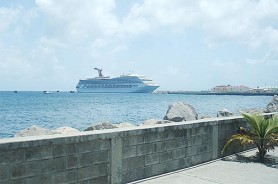The commercialization of child sex abuse in the tourism sector in some Caribbean territories is becoming an escalating problem, according to a recent study commissioned by the United Nations Children’s Fund (UNICEF).

And the study, carried out over the past year in six Caribbean countries – Anguilla, Barbados, Dominica, Grenada, Montserrat and St. Kitts and Nevis -suggests that regional politicians, senior professionals and businessmen are part of the practice of selling and buying sex in business transactions that are underpinned by the exploitation and abuse of young children.
The report, titled `Perceptions of, Attitudes to and Opinions on Child Sexual Abuse in the Eastern Caribbean’ cites the tourist industry in the region as an area where the proclivity for deviant sexual practices by visitors to the region has been ‘packaged’ by service providers in various forms of emerging child abuse including the use of boys to provide sexual services to cruise ship passengers.
The UNICEF study, reportedly the first of its kind in the region and involving more than 1400 respondents in the five Caribbean territories alludes to an escalating pattern of “transactional sexual abuse” in which sex, involving the abuse of minors, is exchanged for money, goods or favours and in which high officials in Caribbean society including politicians and senior professionals are involved.
“Such is the extent of this problem, that it was considered a firmly entrenched and established pattern of behaviour that did not need to be hidden since it was unlikely to attract penalty and, in some circumstances, would not even attract disapproval,” the report says.
The study also found evidence of a lucrative market for child sex tourism alluding to ‘several specific examples of an organized paedophile network,” in which it found that “boys were a specific target.”
The report presents what it says is “an alarming picture of a social problem that is escalating, has increasingly severe consequences for Caribbean societies, has multiple layers and is perpetuated not only by adults who carry out harmful sexual practices with children but also by non-abusing adults through complicity, silence, denial and failure to take appropriate action.”
While the report addresses the problem of ‘sex abuse tourism’ as a social rather than an economic phenomenon it raises the spectre of the Caribbean, particularly the vulnerable populations in the poorer territories in the region becoming an increasing target for sexually deviant visitors from outside the region.
And even as the debate in Guyana and elsewhere in the region over the use of cellular phones in by children in schools rages, the study said that it found evidence of newly emerging trends in sexual abuse and deviancy in the region including cell phone pornography and internet abuse, the latter manifesting itself in “children being approached by predators through social networking sites.”
Meanwhile, the report also cites opportunistic child sexual abuse linked to natural disasters, a phenomenon which could also have commercial underpinnings. “Natural disasters often result in families being relocated to temporary shelters where children are sharing living space with adults who take advantage of them; families are disrupted and focused on survival, this may lead to children being left unsupervised; children may have to fend for themselves and their siblings and are at increased risk of being sexually exploited in return for money,” the report says.
And the report says that in the wake of these emerging sex abuse challenges regional governments may have to reframe their perspectives on child abuse at the policy level through, among other things, the introduction of child-sensitive justice systems for sexual abuse crimes.









